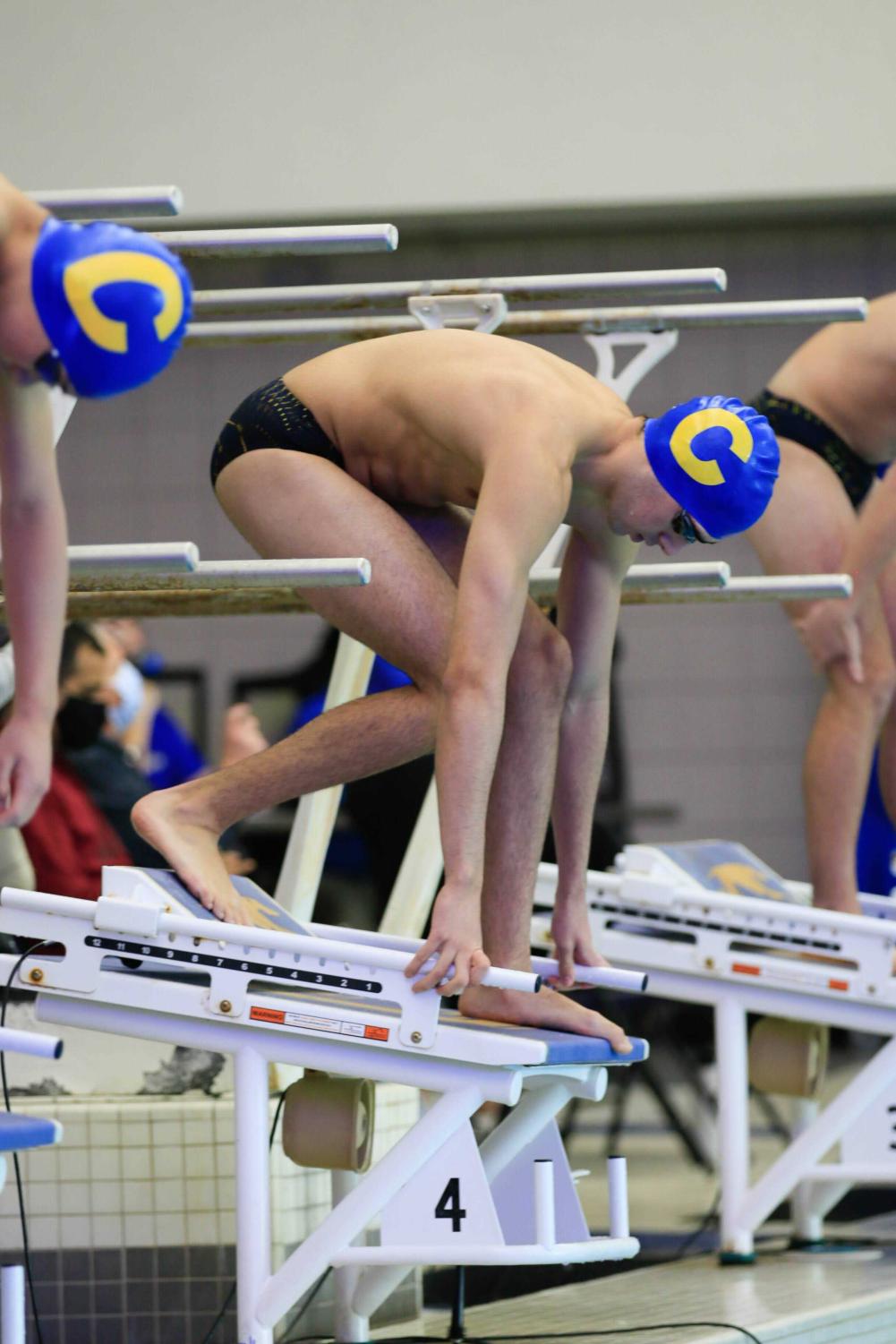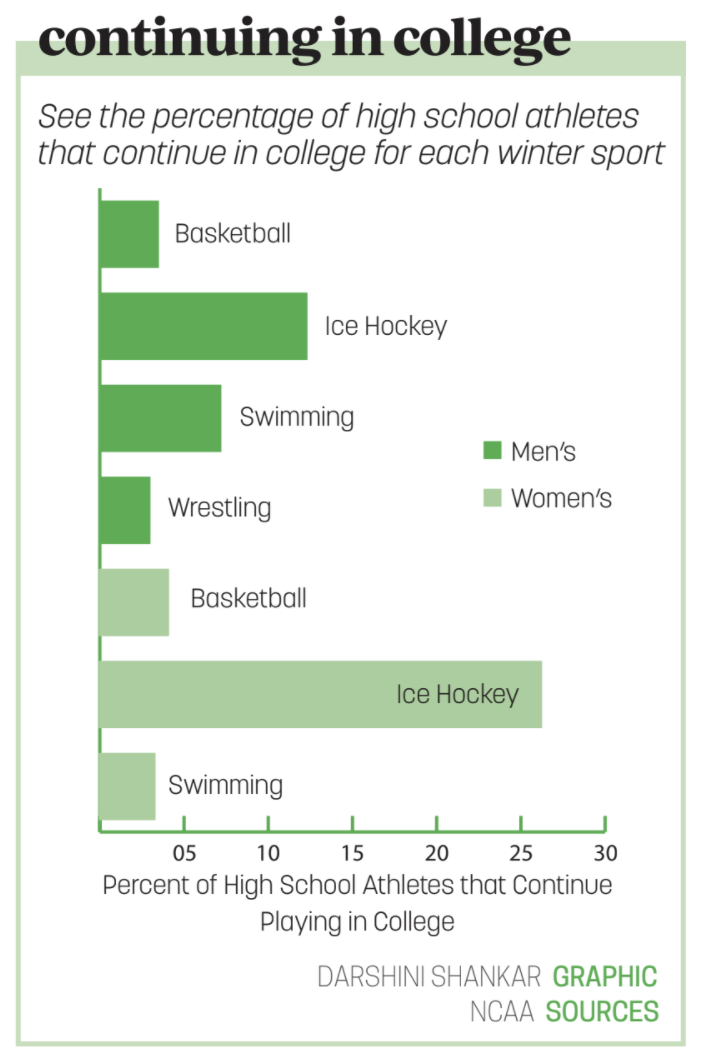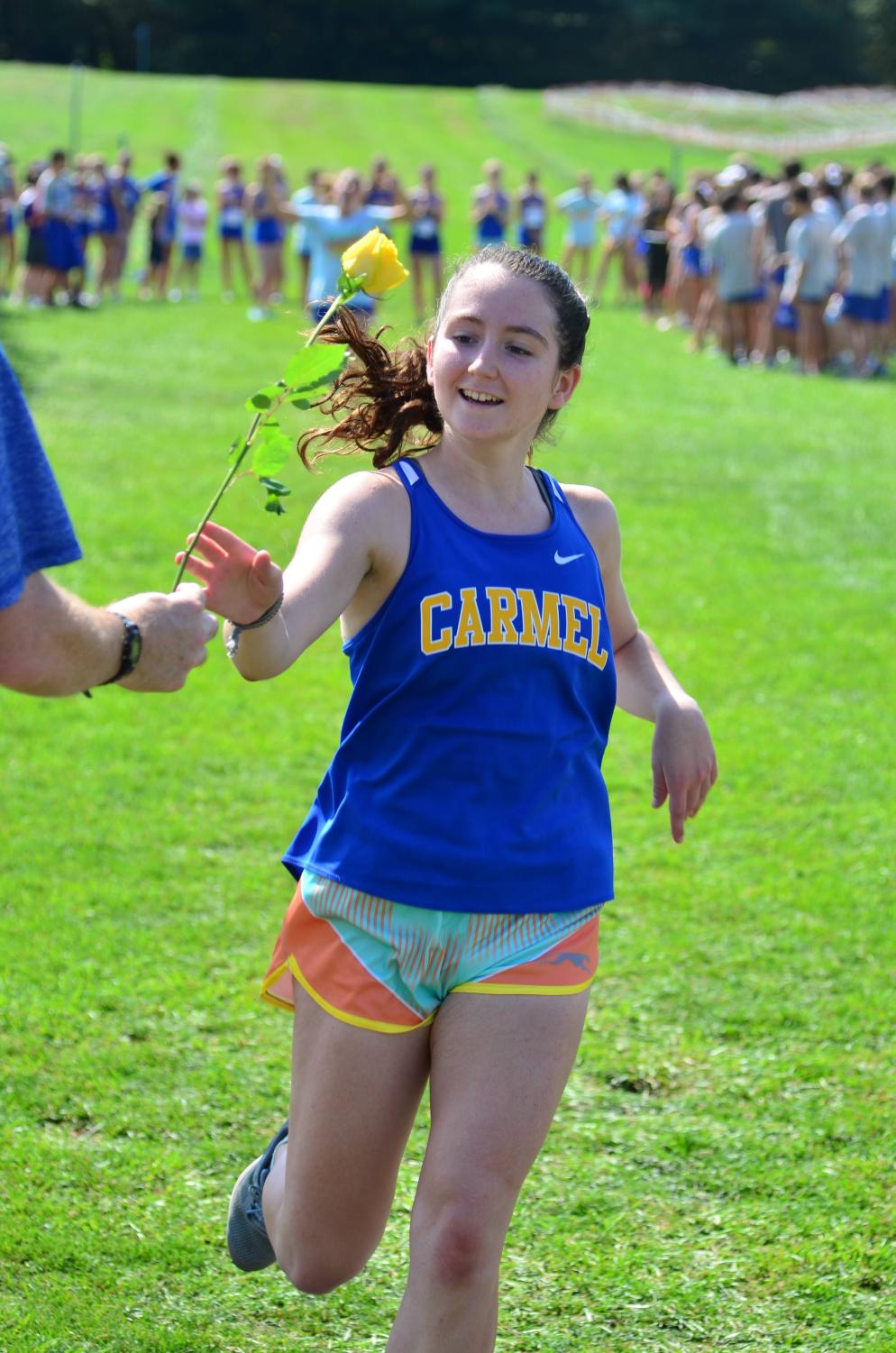As winter sports seasons are finishing up, many seniors at this school are finishing the last sports seasons of their careers. For those who do not choose to play sports in college, adjusting to a life without practices and games can be a challenge.

Dhillon Parikshak, men’s swimmer and senior, is facing these challenges as the swim season progresses. He said facing the end of his swimming career is bittersweet.
“It’s amazing to feel like this is my year to be leading my team after I’ve kind of been learning from the upperclassmen as I’ve done for years,” he said. “But at the same time, it’s a little sad to know that this is the final time that I’ll be competing in a championship season.”
Parikshak is not alone. According to the NCAA, only about 7.2% of high school swimmers in the country move on to swim at the NCAA collegiate level. Those numbers are even lower among sports like track and field and wrestling.
Emily Slade, women’s cross country, track and field athlete and senior said she has a similar perspective to Parikshak’s on her last season.
“I’ve been running since fourth grade, for nine track seasons, so it feels odd to not have any more to look forward to,” she said.
While in different sports, both Parikshak and Slade said their sports have shaped who they were, and those values would help them later in life. Parikshak said lessons from swimming stemmed from the Carmel swimming motto “courage and perseverance.”
“(Courage and perseverance is) something that has really helped me define who I am over the past couple years because it’s difficult to attend eight practices a week (at five) in the morning for four years straight,” he said. “(I have) been swimming for so long, so it really is a rewarding experience despite all the practice and I feel like it’s made me a better person today.”
Slade said running helped her gain confidence, and find a sense of identity that helped her socially.
“Running has helped me get out of my comfort zone and (it) helped me form strong bonds with people I otherwise would not have spoken to,” she said.

Athletes’ experience in their sports also correlates to their relationships with coaches. Aaron McRill, women’s track and field coach, said he tries to incorporate certain values into his coaching to instill in the team. These are life skills that will last even after the time for competing is over.
“Personally I try to be as positive as possible. I’m always trying to instill confidence in our team,” he said. “It’s our job as coaches to try to be positive and confident, even if the athlete is not.”
All of the qualities athletes gain through sports become part of who they are, or their identity. That drives athletes like Parikshak and Slade to continue participating in their sports, even if not at a collegiate level.
But even without the prospect of competing at the university level, many athletes’ still find that sense of connection on club teams. The National Federation of State High School Associations said that collegiate club leagues allow athletes to continue their sports on a recreational level and still be able to devote time to other aspects of their lives.
Parikshak said that option may work for him.
“I definitely feel like I found a sense of identity within swimming. The swim team is really just like a brotherhood, we are all super close and it’s a great team environment,” he said. “Transitioning to college, although I’m not going to have swimming as much of a prominent role in my life, I’m still going to possibly compete on a club swim team during college or swim on my own because it’s definitely still part of who I am today.”

When it comes to the transition to college, many students focus on the academic aspect when choosing a school over athletics. Slade said she would run in college if given the chance, but she said she wants to leave her options open when it comes to academics.
“I didn’t want to limit my university choices to only Division III schools, so I decided not to entertain the thought of running,” she said. “If I end up attending a DIII school and feel like running, I could likely join the team.”
Parikshak said his thoughts aligned with Slade’s.
“I had considered swimming at a DIII school and had been in communication with a few DIII schools, but ultimately I decided to prioritize my education and I am hoping to possibly attend a highly selective academic university next year,” he said.
Overall, Slade said running has taught her how to get through difficult moments and introduced her to lifelong friendships.
She said, “(Running) has provided me with friends who are such driven, bright souls that I’m grateful to have spent hours with daily.”

































![AI in films like "The Brutalist" is convenient, but shouldn’t take priority [opinion]](https://hilite.org/wp-content/uploads/2025/02/catherine-cover-1200x471.jpg)









































![Review: “The Immortal Soul Salvage Yard:” A criminally underrated poetry collection [MUSE]](https://hilite.org/wp-content/uploads/2025/03/71cju6TvqmL._AC_UF10001000_QL80_.jpg)
![Review: "Dog Man" is Unapologetically Chaotic [MUSE]](https://hilite.org/wp-content/uploads/2025/03/dogman-1200x700.jpg)
![Review: "Ne Zha 2": The WeChat family reunion I didn’t know I needed [MUSE]](https://hilite.org/wp-content/uploads/2025/03/unnamed-4.png)
![Review in Print: Maripaz Villar brings a delightfully unique style to the world of WEBTOON [MUSE]](https://hilite.org/wp-content/uploads/2023/12/maripazcover-1200x960.jpg)
![Review: “The Sword of Kaigen” is a masterpiece [MUSE]](https://hilite.org/wp-content/uploads/2023/11/Screenshot-2023-11-26-201051.png)
![Review: Gateron Oil Kings, great linear switches, okay price [MUSE]](https://hilite.org/wp-content/uploads/2023/11/Screenshot-2023-11-26-200553.png)
![Review: “A Haunting in Venice” is a significant improvement from other Agatha Christie adaptations [MUSE]](https://hilite.org/wp-content/uploads/2023/11/e7ee2938a6d422669771bce6d8088521.jpg)
![Review: A Thanksgiving story from elementary school, still just as interesting [MUSE]](https://hilite.org/wp-content/uploads/2023/11/Screenshot-2023-11-26-195514-987x1200.png)
![Review: "When I Fly Towards You", cute, uplifting youth drama [MUSE]](https://hilite.org/wp-content/uploads/2023/09/When-I-Fly-Towards-You-Chinese-drama.png)
![Postcards from Muse: Hawaii Travel Diary [MUSE]](https://hilite.org/wp-content/uploads/2023/09/My-project-1-1200x1200.jpg)
![Review: "Ladybug & Cat Noir: The Movie," departure from original show [MUSE]](https://hilite.org/wp-content/uploads/2023/09/Ladybug__Cat_Noir_-_The_Movie_poster.jpg)
![Review in Print: "Hidden Love" is the cute, uplifting drama everyone needs [MUSE]](https://hilite.org/wp-content/uploads/2023/09/hiddenlovecover-e1693597208225-1030x1200.png)
![Review in Print: "Heartstopper" is the heartwarming queer romance we all need [MUSE]](https://hilite.org/wp-content/uploads/2023/08/museheartstoppercover-1200x654.png)



